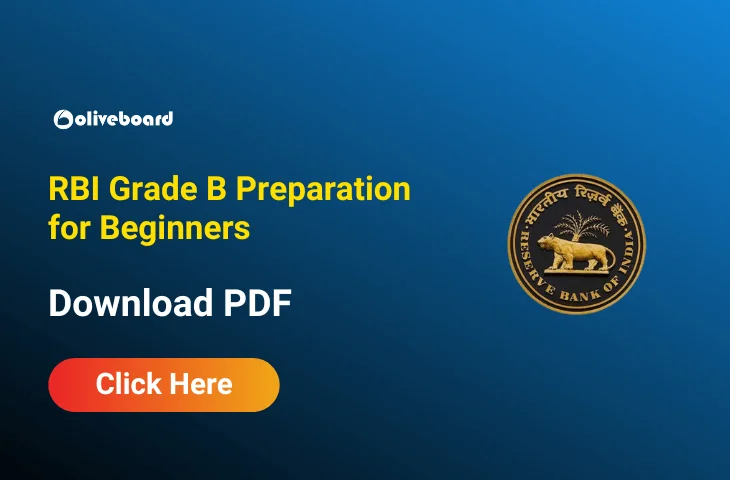Preparing for the RBI Grade B Exam can feel overwhelming, especially if you are just starting out. As one of the most competitive banking exams in India, it demands the right blend of smart study strategies, time management, and consistent practice. The good news is that with a clear plan, even beginners can crack this exam in their first attempt.
In this blog, we’ll cover smart strategies, subject-wise preparation tips, daily practice plans, and mock test approaches to help you build a strong foundation.
Why beginners struggle with the RBI Grade B preparation?
Many aspirants underestimate the exam at the start. Beginners often make mistakes like focusing only on one subject, ignoring current affairs, or trying to memorize everything without understanding. These issues lead to burnout and poor performance in mocks. Knowing these challenges early helps in designing smarter strategies.
How to follow a smart preparation strategy for RBI Grade B?
A smart preparation strategy for the RBI Grade B exam starts with understanding the exam pattern and syllabus, followed by building strong basics, staying consistent with current affairs, managing time efficiently, and using mock tests for continuous improvement. A clear, structured approach helps beginners avoid unnecessary topics, strengthen core concepts, and gradually improve accuracy and confidence across all three phases of the exam.
| Preparation Step | Key Focus Areas |
| understand the exam pattern & syllabus | Phase 1: GA, Quant, Reasoning, English; Phase 2: ESI, FM, English Descriptive; Phase 3: Interview |
| start with basics | strengthen Quant & Reasoning fundamentals, read editorials daily, learn basic economic and financial concepts |
| daily current affairs | dedicate at least 1 hour to newspapers, PIB releases, RBI reports, and maintain revision notes |
| smart time division | weekdays: 2 subjects + current affairs; weekends: mock tests and revision |
| use mock tests wisely | begin with sectional mocks, analyze mistakes, focus on accuracy and improvement |
Subject-Wise Beginner Tips
Each subject in RBI Grade B requires a focused approach. These tips help beginners understand where to start, which resources to use, and how to gradually strengthen their knowledge for both Phase 1 and Phase 2.
| Subject | Beginner Tips | Resources / Focus Area |
| General Awareness (GA) | Focus on last 6 months of current affairs, RBI circulars, monetary policy updates | Newspapers (The Hindu, Economic Times), PIB releases, monthly current affairs compilations |
| Quantitative Aptitude | Start with easy chapters (Simplification, Arithmetic), practice 10–15 questions daily, improve speed gradually | NCERT Maths, R.S. Aggarwal, online quizzes |
| Reasoning | Begin with puzzles and seating arrangements, practice daily | R.S. Aggarwal, Oliveboard mocks, previous year papers |
| English Language | Read editorials for RC, revise grammar basics, practice para-jumbles & error spotting | Newspapers, Wren & Martin, online RC exercises |
| Economic & Social Issues (ESI) | Start with NCERT Economics, follow government schemes, understand inflation, growth models | NCERT Class 10–12, Economic Survey, Budget highlights |
| Finance & Management | Finance: basics of banking, markets, inflation, fiscal vs monetary policy; Management: motivation, leadership, ethics | RBI reports, reference books for Finance & Management, simple notes |
What should be the daily practice plan for beginners?
Consistency is key for beginners. A structured daily practice plan helps you balance subjects, improve speed, and retain concepts effectively. Here’s a sample schedule to guide your RBI Grade B Preparation.
| Time | Activity | Focus Area |
| 7:00 – 8:00 AM | Reading | Newspaper + Current Affairs |
| 10:00 – 11:30 AM | Quant Practice | Arithmetic / DI |
| 12:00 – 1:00 PM | Reasoning Practice | Puzzles + Seating Arrangements |
| 4:00 – 5:30 PM | ESI / Finance | Concepts & Notes |
| 6:00 – 7:00 PM | English Practice | RC + Grammar |
| 8:00 – 9:00 PM | Revision | Short Notes + Flashcards |
What are the common mistakes beginners should avoid?
Before diving into preparation, it’s important to know the pitfalls that can slow you down. Avoiding these common mistakes early will save time, reduce stress, and improve your chances of cracking RBI Grade B on the first attempt.
- Ignoring descriptive papers in Phase 2.
- Reading everything without revision.
- Not practicing answer writing for ESI & Finance.
- Depending only on coaching without self-study.
FAQs
Beginners should aim for 4–6 hours of focused study daily, balancing Quant, Reasoning, GA, English, and Phase 2 subjects like ESI and Finance. Gradually, this can be increased based on comfort and stamina.
Start with basics: Quantitative Aptitude and Reasoning for strong foundations, English for comprehension, and GA/Current Affairs to stay updated. Phase 2 subjects like ESI and Finance can be introduced once basics are clear.
Yes. Mock tests help evaluate preparation, improve time management, and highlight weak areas. Beginners should start with sectional mocks and gradually move to full-length tests.
Practice writing structured answers for ESI and Finance topics regularly. Maintain short notes and revise frequently. Attempt previous year questions to get a sense of writing style and time management.
Read editorials, RBI reports, and newspapers daily. Practice RC passages, para-jumbles, error spotting, and grammar exercises. Maintain a vocabulary list for regular revision.
- NABARD Grade A Phase 2 Information Handout 2026 Released
- NABARD Grade A Phase 2 Shift Timings 2026, Reporting Time
- NABARD Grade A 25th January 2026 Analysis, Exam Trend
- NABARD Grade A Descriptive Writing Preparation 2026, Check Guide
- PFRDA Grade A Salary 2026, Check In Hand Salary
- RBI Grade B Interview Transcripts, Know RBI Interview Questions

Priti Palit, is an accomplished edtech writer with 4+ years of experience in Regulatory Exams and other multiple government exams. With a passion for education and a keen eye for detail, she has contributed significantly to the field of online learning. Priti’s expertise and dedication continue to empower aspiring individuals in their pursuit of success in government examinations.
